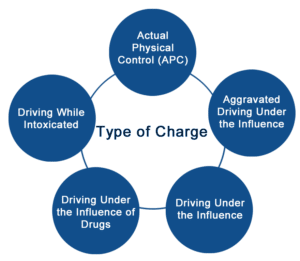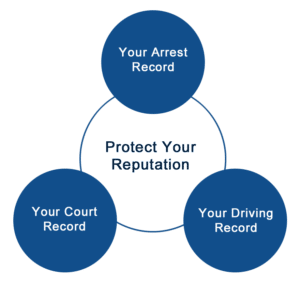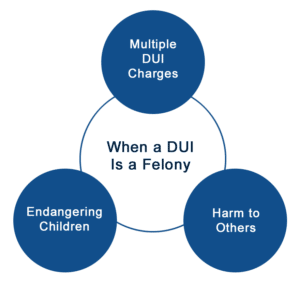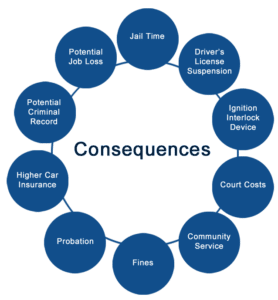DUI First Offense Oklahoma
When you are facing your first DUI offense in the state of Oklahoma, you no doubt have many questions. What can you expect? What are the consequences? What can you do to prepare yourself? Below we’ve compiled an extremely thorough explanation of everything you might face when being charged with DUI first offense.
Ultimately, this all boils down to one key piece of advice: educate yourself. Just because you have been charged does not mean you will be found guilty. Reducing a DUI charge down to a lesser offense or having it dismissed completely is not uncommon, and there are hundreds of ways to go about it.
Read on, and educate yourself on how you can face this accusation with an informed background, and ultimately move on with your life.
DUI, DWI, and APC – Your Charges Explained
There is more than one way to be charged following a traffic stop. What follows is a brief glossary of terms outlining various infractions you may be charged with.
Actual Physical Control (APC) – a charge in which your Blood Alcohol Content (BAC) registers at .08 or higher, and while you were in charge of the vehicle, but were not driving.
Aggravated Driving Under the Influence (DUI – Aggravated) – a charge in which your BAC registers above .15
Driving Under the Influence (DUI) – a charge in which you were found to be driving the vehicle and your BAC registered above .08 but below .15,
Driving Under the Influence of Drugs (DUI-D) –When you are found to be under the influence of intoxicating substances behind alcohol, e.g. illegal drugs or even prescription and OTC medications.
Driving While Intoxicated –This is similar to a DUI charge, but it is one in which your BAC registers less than .08 – typically .06-.07.
 In Oklahoma, any one of these charges, or multiple charges in combination, can apply to a first-time offender. Aggravated DUI carries the harshest penalties, which will be outlined later. And while the consequences of a DUI, DWI or APC charge may be slightly less than the more serious charges, they still need to be taken seriously. Even a minor charge can have a serious impact on your future.
In Oklahoma, any one of these charges, or multiple charges in combination, can apply to a first-time offender. Aggravated DUI carries the harshest penalties, which will be outlined later. And while the consequences of a DUI, DWI or APC charge may be slightly less than the more serious charges, they still need to be taken seriously. Even a minor charge can have a serious impact on your future.
What is Actual Physical Control?
As APC is one of the more complicated types of DUI charge, it’s worth a little extra background to explain how you might end up facing this charge. Essentially, this is a charge that can be applied separate of DUI charges, but are typically only leveled on you when you were not actively driving at the time of the arrest (or the police did not witness you driving).
So for example, let’s say police find you behind the wheel with the car in park and the motor running, or asleep at the wheel of a car that is not running. These situations make it more difficult to prosecute you for DUI (you were, after all, not driving), so they may opt for an APC charge.
Oklahoma law makes it a crime to be under the influence of alcohol or drugs while either operating or being in control of a vehicle, allowing them to level either of these charges against you. And while it may seem like a lesser crime as you were not actively driving, an APC charge carries nearly the same penalties as a DUI in Oklahoma, including large fines, suspension of your license and jail time.
What are the Immediate Consequences for a DUI First Offense?
In the state of Oklahoma, a charge of DUI carries with it two completely separate actions that can brought against you. The first action is a criminal case, in which the prosecution proves your guilt beyond a reasonable doubt to a judge or a jury. Punishments stemming from the criminal charges against you can range from fines to jail time.
The second action that will be brought against you will be aimed at your driving privileges. Separate from the criminal charge, this civil action will be brought against you by the Oklahoma Department of Public Safety and will seek to suspend your driver’s license.
From the date of your arrest, you will have 30 days to respond to these actions against you, either by requesting admission to the Impaired Driver Accountability Program (IDAP) or by filing an appeal to challenge the revocation of your license in District Court. If you fail to take action, your driver’s license will be suspended.
Keeping Your Court Records Out of the Public Eye
 One of the most potentially damaging things that can come out of a DUI arrest is the harm to your reputation. To ensure that your arrest doesn’t come back to haunt you, there are three things you’ll want to make sure to stay as private as possible: your arrest record, your DUI Driving Record and your DUI Court Records.
One of the most potentially damaging things that can come out of a DUI arrest is the harm to your reputation. To ensure that your arrest doesn’t come back to haunt you, there are three things you’ll want to make sure to stay as private as possible: your arrest record, your DUI Driving Record and your DUI Court Records.
Your Arrest Record
Any arrest for DUI, APC or DWI will show up on the arrest record maintained by the Oklahoma State Bureau of Investigation. The process of removing this arrest from your record, known as an expungement, is often more difficult than clearing your criminal record, and is often only undertaken under special circumstances such as a dismissal or a reduction in charges.
Your Driving Record
Immediately upon your arrest, the officer who initiated the stop will confiscate your driver’s license and file a report with the Department of Public Safety (DPS). The DPS will then add the incident to your driving record, starting the 30-day window you have in which to request an Administrative Driver’s License Suspension Hearing. Successfully contest your suspension and your license will be restored and your driving record will remain clean.
Your Court Record
The third aspect of an arrest is the most potentially damaging, since your court record will be public information. This means potential employers and even your neighbors will have access to the full details of your arrest. This record is tracked by the Oklahoma Supreme Court Network, created as soon as police submit charges to the prosecution. If your case is reduced or dismissed, it is possible to have this record sealed or expunged, blocking it from public view.
First Offense DUI: Misdemeanors vs. Felonies
For the most part, DUI or APC charges in Oklahoma will be considered a misdemeanor. A misdemeanor is an offense which carries a punishment of no more than one year in a county jail.
 Under certain circumstances, however, a DUI can be considered a felony in Oklahoma. Sentences for felonies are typically much more serious, including a year or more in state prison, and carry heavier fines and greater repercussions. There are several scenarios that may lead to a DUI being charged as a felony:
Under certain circumstances, however, a DUI can be considered a felony in Oklahoma. Sentences for felonies are typically much more serious, including a year or more in state prison, and carry heavier fines and greater repercussions. There are several scenarios that may lead to a DUI being charged as a felony:
- Multiple DUI charges. If this is your second, third or subsequent DUI within a period of 10 years, it may be classified as a felony.
- Harm to others. If your DUI is issued during an incident that caused substantial injuries or death, you could face felony charges.
- Endangering Children. If there is a child in the car with you when you are arrested for DUI, you can expect felony charges.
Did Your Take or Refuse the Tests and Were The results Over the Legal Limit?
One of the biggest factors in determining the consequences of your DUI is your BAC at the time of the arrest. As such, the punishment ultimately rests on the question of whether you submitted for testing or not. It’s not common knowledge, but under the law you do have the legal right to refuse to be tested.
There are, however, larger ramifications if you refuse to be tested. In the state of Oklahoma, you automatically consent to DUI tests in the event of a traffic stop under the terms of what is called “implied consent.” You may refuse, but it may result in suspension of your license for six months or more.
Legally, the arresting officer cannot force you to submit to DUI testing. If you refuse, the immediate consequences will largely be the same as if you had tested over the legal limit – the officer will serve you with an Officer’s Affidavit and Notice of Revocation/Disqualification. From this point, you will have 30 days to schedule an administrative hearing or your license will be automatically revoked for no less than six months.
License Suspension: What You Need to Know
Before we can talk about any further consequences, such as fines or jail time, it will help you to understand the consequences to your ability to drive. Before we can fight to restore your record, we need to fight to restore your license, giving you the freedom to continue your life.
Your first DUI offense will carry with it a potential suspension of your license up to six months or longer.
As mentioned, you have 30 days from the date of the arrest to fight a suspension by filing for an administrative hearing. This can be one of the most crucial moves you can make in building your defense. Whether it’s a DUI, DWI or APC charge, filing for a hearing gives us a chance to dive into the evidence against you and go looking for cracks in the prosecution’s case. Any mistakes we find here, whether it’s a procedural error or something that was omitted from the original report of the traffic stop, can go a long way toward eventually reducing your charges or having your case dismissed.
Contesting a First-Offense DUI License Suspension
While this hearing is a valuable tool in building your defense, it is not the only way to maintain your ability to drive. When the arresting officer issues you a notice of revocation stating that they will be confiscating your license, they will also give you a document explaining your rights at that point. What this document boils down to is that you have two choices: schedule a hearing and contest the suspension or apply for the IDAP. This is the program where you have to have an ignition interlock device installed to start your vehicle.
As mentioned, contesting your license suspension lets your attorney gain insights into the case against you and begin strategizing your DUI defense. The upside of this hearing is that if you are successful in contesting the suspension, you can keep your license and continue driving without an ignition interlock device.
Overseen by a judge, rather than a jury, this hearing operates basically like any other trial. You aren’t even required to attend. During this hearing, the Department of Public Safety will be listed as the defendant, but ultimately the burden of proof will be on them. What that means is that they will have to show to the judge that each of these criteria was met:
- The officer had probable cause to initiate the traffic stop.
- The officer arrested the individual in question (you)
- That you were fully informed of your rights and advised of any consequences for taking or refusing a BAC test.
- That you either refused the test, or took the test and were found to be over the legal limit.
Not only is this a great opportunity to learn more about the case against you, the Edge Law Firm is proud of our record in contesting license suspensions in these hearings.
Applying for the Impaired Driver Accountability Program
The alternative to scheduling a hearing to contest your suspension is to apply for the IDAP. This program, administered by the state, requires you to have an ignition interlock device installed in your vehicle. This device will only allow your vehicle to start after a successful breath test, and will give you the ability to continue driving while your criminal case is pending.
The device will remain installed for the same amount of time that your license revocation would be. For your first DUI or related charge, this period of time would be 180 days. If this is your second, third or subsequent charge in the span of 10 years, this period of time would range from 1-3 years.
Fines, Probation and More: The Consequences of DUI a First Offense DUI in Oklahoma
 Beyond criminal charges and license suspension, there are a host of consequences that can stem from a DUI, DWI or APC charge.
Beyond criminal charges and license suspension, there are a host of consequences that can stem from a DUI, DWI or APC charge.
Fines: First, let’s talk about what this is going to cost you. The initial fines vary based on the governing body issuing the charges, with fines running up to $1,000. In addition, court costs for DUI charges typically ring up higher than most, ranging anywhere from $800-$1,000. These are all ballpark terms, of course. Fines can vary based on a number of factors including which individual court hears your case.
Probation: Beyond the financial hit you’ll take, you may also face a period of probation, even for your first DUI offense. This is a great alternative to jail time but does carry some pretty strict requirements. You may be required to avoid alcohol. There will be several rules you have to follow and an officer you’ll need to check in with. Fail to meet these conditions and you will violate your probation. The length of this probation varies for each case.
Further Consequences: Another result of a DUI, DWI or APC charge may be required enrollment in a substance abuse course and/or appearance at a victim impact panel. The Alcohol and Drug Substance Abuse Course (commonly known as DUI School) is a series of lessons and classes outlining the dangers of abusing alcohol or drugs as they relate to operating a motor vehicle. Typically, this course will last between 10-24 hours.
You may also be required to attend a Mothers Against Drunk Driving (MADD) victim impact panel, where those who have had their lives changed by drunk driving will share their stories while you listen in silence.
Beyond the Charges: The risk of jail time and the host of fines and fallout from your charge would be consequence enough, but there are penalties beyond these that you might not be considering. Your inability to drive a car, if you are unable to fight your license suspension, will impact your ability to obtain or keep a job, live your life and move on. It can also increase your car insurance premiums, and create huge roadblocks for your ability to advance in your career.
A charge of DUI, DWI or APC can have long-lasting impacts, affecting your credit score or your ability to secure housing. As a fixture of your permanent record, it can affect your ability to gain a medical or nursing license, and can even lead to revocation of a medical or nursing license. If you have a career that requires security clearance, that can become difficult to obtain. If you are divorced with children, a charge can impact your custodial rights. And if you are charged with a felony, you could lose your constitutional rights to possess a firearm.
DUI, DWI and APC First-Offense in Oklahoma When You’re Under 21
Under Oklahoma law, DUI under 21 is classified as a misdemeanor. If you are under 21, it is illegal to drive or otherwise be in any kind of physical control of a motor vehicle if:
- You had any amount of alcohol in your blood or breath at the time of testing, to be administered within two hours of the arrest. Legally, this is defined as a BAC reading of .02 or above.
- Tests of other specimens (e.g. blood, urine) show any amount of evidence of intoxicating substances.
- You show any signs of intoxication or of being under the influence.
As a misdemeanor, DUI Under 21 does not carry any risk of jail time, but it does carry a six-month or longer suspension of your license. As mentioned, you will have 30 days from the time of your arrest to fight this suspension. You can also expect further consequences including 20-480 hours of community service, mandatory attendance of a treatment program, fines ranging from $100-$500, or a combination of all three.
Being under 21 Does NOT prevent you from being charged with the adult crime and is subject to all of the penalties if you test over .08.
DUI, DWI and APC First-Offense in Oklahoma for CDL Holders
Whether you are actively driving for work or are simply driving in your personal vehicle, you can expect to face a separate set of additional penalties if you hold a commercial driver’s license. For starters, there are criminal ramifications for CDL holders charged with DUI, DWA or APC that include 10 days to a year in jail and fines up to $1,000.
But that’s not all. CDL holders are not eligible for the IDAP, meaning you will not have that option when it comes to appealing a license suspension. If you were in control of your commercial vehicle at the time of the arrest, a BAC as low as .04 can disqualify your CDL.
This disqualification from commercial driving can run anywhere from a year up to a lifetime ban, with a lengthy default punishment of up to three years for those who hold a hazardous material placard. Please read our in-depth article about DUI and CDL charges in Oklahoma.
Punishment Beyond DUI, DWI and APC
As outlined above, there are charges that carry stiffer penalties than a run-of-the-mill DUI in the state of Oklahoma. If charged with Aggravated DUI, and even if this is your first, you can expect heightened consequences.
Aggravated DUI Punishment: Stemming from a BAC test of above .15, Aggravated DUI carries with it an even harsher set of penalties. These can include required 28-day inpatient alcohol treatment with one year of probationary aftercare following your release. You will also be required to install an IID in your vehicle, complete 480 hours of community service and submit to period testing and monitoring.
How We Can Help
At the Edge Law Firm, we walk into every hearing and every meeting better prepared than the prosecution, and thus better equipped to win. Time and time again we’ve seen how the attorney who has planned ahead, who has anticipated every obstacle, who has turned over every stone, and who has a better grasp on the facts wins more often.
To us, there is no DUI case that cannot be won. It seems like a bold statement, but it’s one that we’ve backed up with a tenacious commitment and our exhaustive preparation time and time again. We get charges dropped, or at least reduced, because we put in the work the other side can’t.
Schedule your free, no-obligation review of your case today to see what a difference our approach makes. From that first meeting, we will get to work gathering evidence, interviewing witnesses, examining documents, and sniffing out any mistakes made by law enforcement, labs, or government agencies.
We bring all of these facts to the negotiating table, setting the tone before a court date is even determined. If the prosecutor isn’t convinced to reduce or drop the charges right then and there, we’ll see them in court. Armed with the knowledge we’ve gathered, we will bring your side of the story into the light, attacking the case against you and ultimately striving to win you back your freedom.
Use the form below to schedule your evaluation today, then let’s get to work. You have so much to gain and nothing to lose.
Please submit our secure contact form below:
